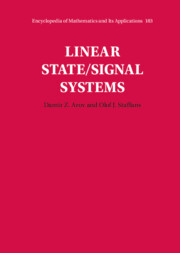Book contents
- Frontmatter
- Contents
- Preface
- Notations
- 1 Introduction and Overview
- 2 State/Signal Systems: Trajectories, Transformations, and Interconnections
- 3 State/Signal Systems: Dynamic and Frequency Domain Properties
- 4 Input/State/Output Representations
- 5 Input/State/Output Systems: Dynamic and Frequency Domain Properties
- 6 Bounded Input/State/Output Systems in Continuous and Discrete Time
- 7 Bounded Input/State/Output Systems in Continuous and Discrete Time
- 8 Semi-bounded Input/State/Output Systems
- 9 Semi-bounded State/Signal Systems
- 10 Resolvable Input/State/Output and State/Signal Nodes
- 11 Frequency Domain Input/State/Output Systems
- 12 Frequency Domain State/Signal Systems
- 13 Internally Well-Posed Systems
- 14 Well-Posed Input/State/Output Systems
- 15 Well-Posed State/Signal Systems
- Appendix A Operators and Analytic Vector Bundles in H-Spaces
- References
- Index
10 - Resolvable Input/State/Output and State/Signal Nodes
Published online by Cambridge University Press: 05 May 2022
- Frontmatter
- Contents
- Preface
- Notations
- 1 Introduction and Overview
- 2 State/Signal Systems: Trajectories, Transformations, and Interconnections
- 3 State/Signal Systems: Dynamic and Frequency Domain Properties
- 4 Input/State/Output Representations
- 5 Input/State/Output Systems: Dynamic and Frequency Domain Properties
- 6 Bounded Input/State/Output Systems in Continuous and Discrete Time
- 7 Bounded Input/State/Output Systems in Continuous and Discrete Time
- 8 Semi-bounded Input/State/Output Systems
- 9 Semi-bounded State/Signal Systems
- 10 Resolvable Input/State/Output and State/Signal Nodes
- 11 Frequency Domain Input/State/Output Systems
- 12 Frequency Domain State/Signal Systems
- 13 Internally Well-Posed Systems
- 14 Well-Posed Input/State/Output Systems
- 15 Well-Posed State/Signal Systems
- Appendix A Operators and Analytic Vector Bundles in H-Spaces
- References
- Index
Summary
In this chapter, we continue the study of the resolvent set and the i/s/o resolvent matrix of an i/s/o node Σ begun in Chapter 5. In particular, we show that if Σ is resolvable, i.e., if Σ has a nonempty resolvent set ρ(Σ), then the main operator A of Σ is also resolvable and ρ(Σ) = ρ(A). Moreover, the i/s/o resolvent matrix is analytic and satisfies the i/s/o resolvent identity in ρ(Σ). Even more interesting is the converse claim: every i/s/o pseudoresolvent is a restriction of the i/s/o resolvent matrix of a unique i/s/o node Σ, where we by an i/s/o pseudo-resolvent mean a locally bounded block matrix operator-valued function that satisfies the i/s/o resolvent identity in some open subset Ω of C. In particular, every i/s/o pseudo-resolvent is analytic. Our class of regular resolvable i/s/o nodes is known from before in the literature with more complicated definitions and different names (e.g., in Staffans, 2005; systems that belong to this class are called “operator nodes”). At the end of this chapter, we continue the study of the connection between the characteristic bundles of a s/s system Σ and the i/s/o resolvent matrices of i/s/o representations of Σ and show that these characteristic bundles are analytic in ρ(Σ).
- Type
- Chapter
- Information
- Linear State/Signal Systems , pp. 599 - 678Publisher: Cambridge University PressPrint publication year: 2022

